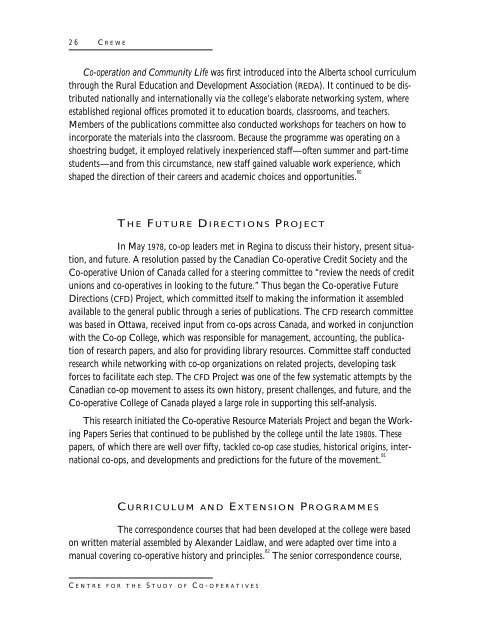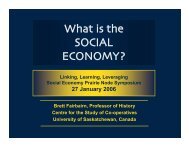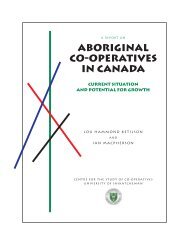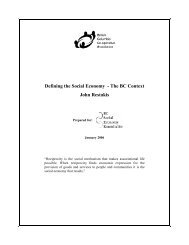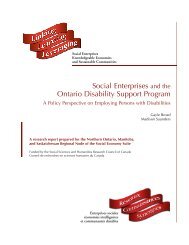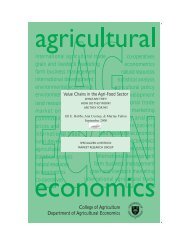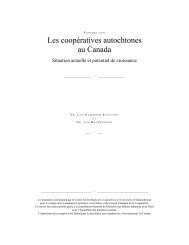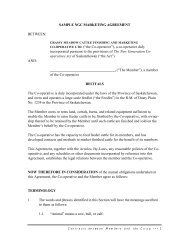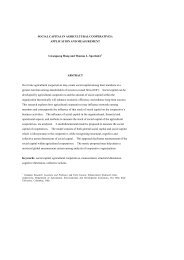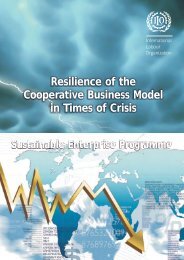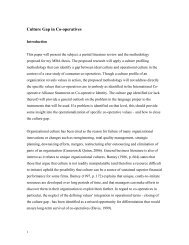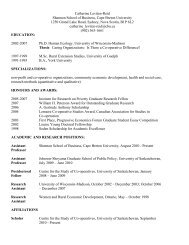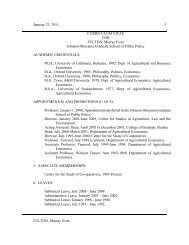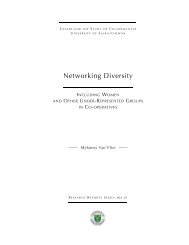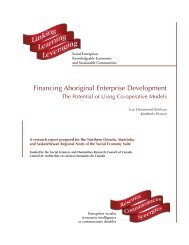Co-op College History - Centre for the Study of Co-operatives
Co-op College History - Centre for the Study of Co-operatives
Co-op College History - Centre for the Study of Co-operatives
Create successful ePaper yourself
Turn your PDF publications into a flip-book with our unique Google optimized e-Paper software.
26 CREWE<br />
<strong>Co</strong>-<strong>op</strong>eration and <strong>Co</strong>mmunity Life was first introduced into <strong>the</strong> Alberta school curriculum<br />
through <strong>the</strong> Rural Education and Devel<strong>op</strong>ment Association (REDA). It continued to be distributed<br />
nationally and internationally via <strong>the</strong> college’s elaborate networking system, where<br />
established regional <strong>of</strong>fices promoted it to education boards, classrooms, and teachers.<br />
Members <strong>of</strong> <strong>the</strong> publications committee also conducted worksh<strong>op</strong>s <strong>for</strong> teachers on how to<br />
incorporate <strong>the</strong> materials into <strong>the</strong> classroom. Because <strong>the</strong> programme was <strong>op</strong>erating on a<br />
shoestring budget, it employed relatively inexperienced staff—<strong>of</strong>ten summer and part-time<br />
students—and from this circumstance, new staff gained valuable work experience, which<br />
shaped <strong>the</strong> direction <strong>of</strong> <strong>the</strong>ir careers and academic choices and <strong>op</strong>portunities. 80<br />
T HE F UTURE D IRECTIONS P ROJECT<br />
In May 1978, co-<strong>op</strong> leaders met in Regina to discuss <strong>the</strong>ir history, present situation,<br />
and future. A resolution passed by <strong>the</strong> Canadian <strong>Co</strong>-<strong>op</strong>erative Credit Society and <strong>the</strong><br />
<strong>Co</strong>-<strong>op</strong>erative Union <strong>of</strong> Canada called <strong>for</strong> a steering committee to “review <strong>the</strong> needs <strong>of</strong> credit<br />
unions and co-<strong>op</strong>eratives in looking to <strong>the</strong> future.” Thus began <strong>the</strong> <strong>Co</strong>-<strong>op</strong>erative Future<br />
Directions (CFD) Project, which committed itself to making <strong>the</strong> in<strong>for</strong>mation it assembled<br />
available to <strong>the</strong> general public through a series <strong>of</strong> publications. The CFD research committee<br />
was based in Ottawa, received input from co-<strong>op</strong>s across Canada, and worked in conjunction<br />
with <strong>the</strong> <strong>Co</strong>-<strong>op</strong> <strong>Co</strong>llege, which was responsible <strong>for</strong> management, accounting, <strong>the</strong> publication<br />
<strong>of</strong> research papers, and also <strong>for</strong> providing library resources. <strong>Co</strong>mmittee staff conducted<br />
research while networking with co-<strong>op</strong> organizations on related projects, devel<strong>op</strong>ing task<br />
<strong>for</strong>ces to facilitate each step. The CFD Project was one <strong>of</strong> <strong>the</strong> few systematic attempts by <strong>the</strong><br />
Canadian co-<strong>op</strong> movement to assess its own history, present challenges, and future, and <strong>the</strong><br />
<strong>Co</strong>-<strong>op</strong>erative <strong>Co</strong>llege <strong>of</strong> Canada played a large role in supporting this self-analysis.<br />
This research initiated <strong>the</strong> <strong>Co</strong>-<strong>op</strong>erative Resource Materials Project and began <strong>the</strong> Working<br />
Papers Series that continued to be published by <strong>the</strong> college until <strong>the</strong> late 1980s. These<br />
papers, <strong>of</strong> which <strong>the</strong>re are well over fifty, tackled co-<strong>op</strong> case studies, historical origins, international<br />
co-<strong>op</strong>s, and devel<strong>op</strong>ments and predictions <strong>for</strong> <strong>the</strong> future <strong>of</strong> <strong>the</strong> movement. 81<br />
C URRICULUM AND E XTENSION P ROGRAMMES<br />
The correspondence courses that had been devel<strong>op</strong>ed at <strong>the</strong> college were based<br />
on written material assembled by Alexander Laidlaw, and were adapted over time into a<br />
manual covering co-<strong>op</strong>erative history and principles. 82 The senior correspondence course,<br />
C ENTRE FOR THE S TUDY OF C O - OPERATIVES


